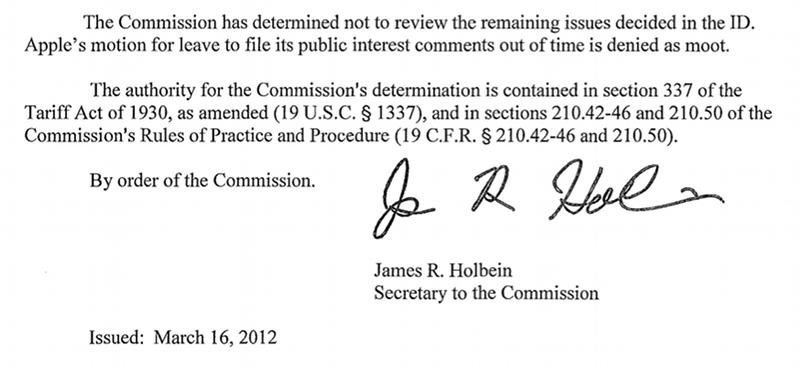The six-member commission at the head of the ITC gave notice that it had finished a partial review of the case's initial determination (ID), and sided with the ruling of an administrative law judge who found that Motorola did not infringe upon three Apple patents, reports FOSS Patents' Florian Mueller.
Apple first filed the ITC complaint in October 2010 in response to a Motorola patent attack, alleging that the telecom giant's Droid, Droid 2, Droid X and other smartphones infringed on existing multitouch patents. The subsequent investigation concluded in January when an ALJ found that Motorola were not in violation of the asserted Apple patents.
The three patents asserted against Motorola were U.S. Patent No.7,812,828 for "elipse fitting for multi-touch surfaces," No. 7,663,607 for a "multipoint touchscreen" and No. 5,379,430 for an "object-oriented system locator system."
Friday's judgment is the result of Apple's final petition for review of the ALJ's ruling, which the company filed for in February.
Excerpt of Friday's ITC ruling that held Motorola in "no violation" of Apple patents. | Source: ITC (pdf document)
Apple has the option to dispute the decision in federal court, and Mueller believes this will likely happen considering the iPhone maker is appealing a partially-won ITC ruling involving Taiwanese company HTC.
The aforementioned ITC investigations were being closely watched by Google because the outcome of each directly affects either the Android OS or the online search monolith itself as Motorola Mobility is in the process of being acquired by Google for a reported $12.5 billion. The deal will net the Mountain View, Calif. company some 25,000 patents, many of which are related to wireless technology.
Mueller noted in February that Google filed public interest statements with the ITC regarding both the Motorola and HTC investigations as a self-proclaimed "non-party."
"Should the Commission enter an exclusion order, it will reward Apple for asserting patented technologies that are, at best, minor components of the accused products," Google wrote about the Motorola infringement case. The statement went on to say that ""Apple needs no protection from the forces of the market; it is the largest seller of mobile devices, with a record $46.33 billion in recent quarterly revenue and $13.06 billion in quarterly net profit."
 Mikey Campbell
Mikey Campbell







-m.jpg)






 William Gallagher
William Gallagher
 Wesley Hilliard
Wesley Hilliard

 Christine McKee
Christine McKee
 Malcolm Owen
Malcolm Owen

 Andrew Orr
Andrew Orr





-m.jpg)




60 Comments
Those patent descriptions were WAAAAY over my head...
Besides, I'm afraid I infringe on the "object-oriented system locator system" when I fumble for my lamp switch in the dark.
Oh well... Apple has plenty of other patents to clobber Googorola.
Motorola is essentially a dead $12 billion company being used as an ineffective patent weapon.
What a waste...
Oh well... Apple has plenty of other patents to clobber Googorola.
Motorola is essentially a dead $12 billion company being used as an ineffective patent weapon.
What a waste...
When everything else fails, at least we'll have denial.
"Should the Commission enter an exclusion order, it will reward Apple for asserting patented technologies that are, at best, minor components of the accused products," Google wrote about the Motorola infringement case. The statement went on to say that ""Apple needs no protection from the forces of the market; it is the largest seller of mobile devices, with a record $46.33 billion in recent quarterly revenue and $13.06 billion in quarterly net profit."
The ITC isn't the final arbiter. It will eventually be up to the courts to decide if the patents were infringed. Recent ITC rulings suggest that the ITC almost never rules a patent to be infringed.
In any event, the logic here is bogus.
1. "It was only a modest infringement, so it's OK"
and
2. "Apple has lots of money, so they don't deserve patent protection"
Neither one of those is a valid legal argument- and is further evidence that the ITC is not going to enforce any patents from anyone. The courts will decide.
What exactly has Apple gained from the Steve Jobs nuclear litigation strategy? Miscellaneous positive and negative ruling with counter-suits in various jurisdictions around the world resulting in a rather expensive stalemate. I would hope that Mr Cook and company would take a more rational view, and cut some deals with the big companies ala Google, Samsung, etc. Use the legal budget to defend against the never ending stream of patent trolls such Proview and sue those who make obviously copies of their products that any lay non-tech person (to include the Judges that make rulings) will readily understand, ala Pystar. If somebody starts making knock-off iPhones that run iOS, you probably have a good case.